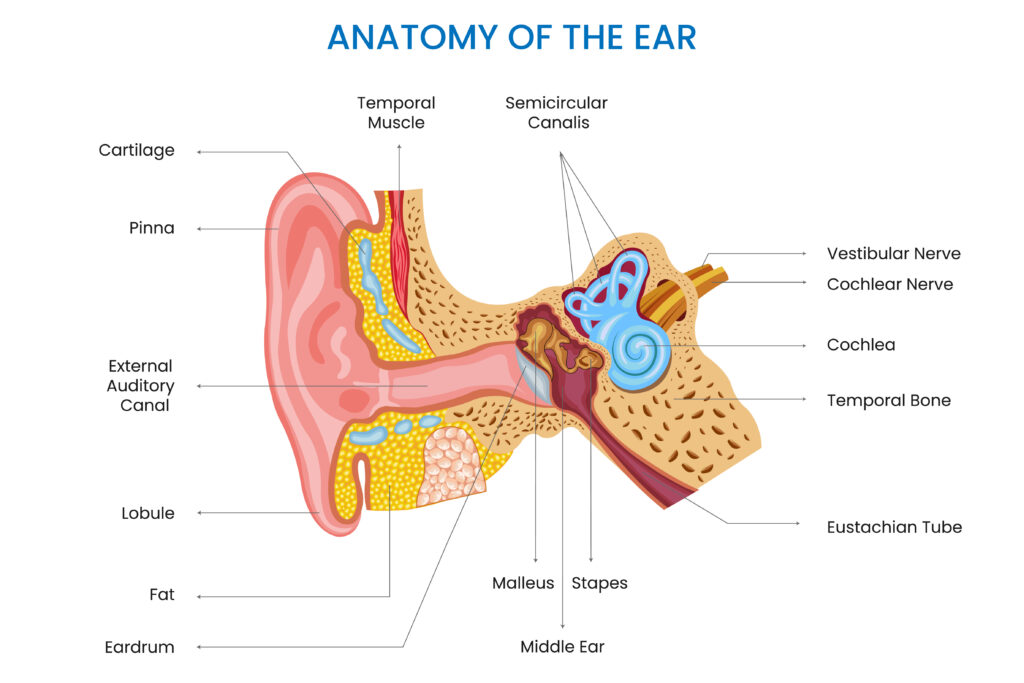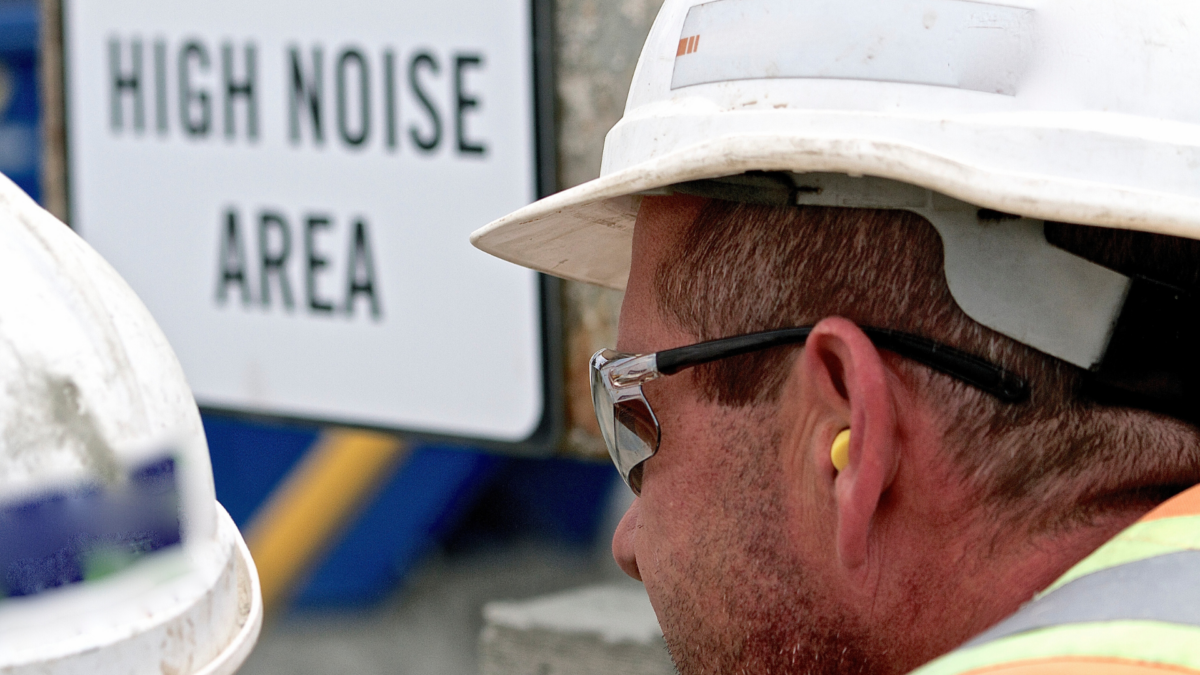Try this for a moment. Find a quiet place and close your eyes. Do you hear anything? Maybe there’s a little buzz – the kind of sound you might associate with the hum of a refrigerator.
The reason we ask is because the Clogger factory is a loud place. The whir of sewing machines is relentless and staff are exposed to near constant noise. It’s well within the health and safety guidelines, but as we know from making chainsaw protection, meeting standards is only really the start. More can be done. That’s why we have a mobile audiology clinic come to the premises once a year and staff can get their hearing tested, and receive advice on what to do should a problem be identified.
As an arborist you probably have a hearing screener every year, too. If not, we highly recommend it and there’s a number of reasons why. And while we make chainsaw protection, not hearing protection, we feel a duty of care to explain more about what we uncovered about hearing health so you can advance your hearing guard. Because you really will want to…
Hearing Balance & Safety
Inside the inner ear is the balance system. The two (ear and balance) are closely linked and while the ability to hear is not a prerequisite for balancing, there is a cause and effect relationship that is well documented and proven. For example, individuals with mild hearing loss are three times more likely to report falling in a 12 month period.
The act of balancing can be cognitively demanding and there is believed to be a link between hearing loss and cognitive decline, creating the cause and effect relationship where the hearing loss can contribute to cognitive impairment, which in turn makes it harder to balance and maintain situational awareness.
Without trying to sound alarmist (and that’s really not a poor pun given the subject matter) even mild hearing loss is considered enough to double the risk of dementia (a form of cognitive decline). Moderate hearing loss will triple the risk and severe hearing loss will 5 x the risk of dementia.

Ears as an Early Warning System
Behind the eardrum, right next to the cochlea, is the catchily named stria vascularis. We’ll call it SV for short. SV does a pretty remarkable job by putting up a blood-labyrinth barrier that prevents nasty toxins from getting into your ear. Old SV doesn’t stop everything though and rather handily lets energy and blood have a free pass. We need both to be able to hear so a good supply is vital.
That good supply can be compromised if the cells acting as sound wires around the SV start to die. Now, there will often be no discernable loss of hearing at this point even though enough blood is not getting through. So why worry about it? Because the SV is signaling a potentially chronic condition way before the rest of the body exhibits any symptoms.
The red warning flag raised by the SV, which is only detectable by Audiologists, signals the potential presence of cardiovascular disease, diabetes, anemia, kidney dysfunction and the already-mentioned dementia.
We know what you’re thinking. As an arborist, you’re fit and healthy so don’t need to worry about any chronic conditions and hopefully that’s true. However, 1 in 2 Americans do suffer from a chronic condition and the big one, cardiovascular disease, makes it into every top 5 cause of death list for all age groups from 18 to 64.
Hearing issues actually precede clinical symptoms of cardiovascular disease and there’s a tell-tale pattern to the type of hearing loss that identifies problems – it’s an uncommon low frequency hearing loss, and it’s often imperceptible by the sufferer but not the audiologist.
Another popular chronic condition is diabetes. It affects over 18 million Americans, while another 40 million plus are pre-diabetic. The main point here is that pre-diabetes is reversible if detected and treated early enough. Again, our friend the SV will raise a flag as high blood glucose levels damage the small blood vessels.
The take home message is not that hearing loss might mean the presence of a chronic condition (although it might and is often a comorbidity) but that an annual hearing screener will help identify issues before they become really problematic and irreversible, and way before the rest of the body decides to tell you something isn’t quite right. Think of an annual screener as like getting an oil change for the truck. You do it even though there’s no issues, because you know it will help prolong the life of the engine. It’s the same with hearing, you get it screened to prolong your life with healthy hearing.
Hearing Loss and Fatigue
The physical and mental demands of a life in or around trees are well documented and becoming fatigued is an ever-present danger. Yet while most will associate the feeling of fatigue with physical or mental exhaustion, it’s increasingly listening fatigue that’s to blame. This is a direct consequence of the presence of constant noise. It doesn’t need to be at excessive levels, just constant. The brain suddenly decides it needs to take a break and lets you know by reducing energy levels, making it hard to concentrate, increasing irritability and stress levels, and generally robbing an individual of motivation.
If a mild hearing loss is present then a listening fatigue will often be quicker to set in, as more cognitive function is needed to listen, tiring the individual out quicker and accelerating the whole viscous process. Incidentally, this may very well be the reason we tire quickly in the presence of verbose mother-in-laws.

Do You Still Hear the Chainsaw After You Turn it Off?
At the start of this blog we asked you to find a quiet place and close your eyes, then listen to discover if you simply hear silence, or something else. If you didn’t do that – give it a go now.
Did you hear a ringing sound? Maybe it presented as a buzzing, chirping, or even hissing sound like static on an old TV. If you heard any of those then it could be Tinnitus.
Tinnitus is a disorder of the auditory or hearing system, and it’s a symptom of something else going on in the body or auditory system. In simple terms, your brain is creating a sound where one doesn’t exist. This might be as a result of exposure to loud sounds, stress or even a sinus infection. Generally speaking, there is no known single cause and that’s why it’s often labeled as idiopathic.
There’s no cure either. Tinnitus can be managed but it cannot be cured. It’s also very common, with 1 in 4 adults suffering to some degree. For most, it’s entirely manageable and not bothersome. For others, it can lead to depression and a very real decrease in the quality of life.
That’s something else to beware of too. Hearing loss is closely linked to feelings of isolation and depression. It can be socially excluding and force a person to retreat within themselves.
How to Protect Your Hearing
We know from our research that there are some pretty strict rules around workplace noise and what can be done to mitigate the risk of exposure, such as providing hearing protection. Alas, we also discovered that even when hearing protection is provided it doesn’t always get used and it might not be good enough even if used. In fact, 25% of the US workforce are at risk of hearing problems due to inadequate protection.

We’re not about to invent better hearing protection and there’s no chance of Clogger Zero dB Ear Plugs being created. So our best recommendation is to go see an audiologist and get a baseline reading for your hearing, then track it with a screener every year. A lot of employers will even fund the Audiology appointment.
Anyway, now we’ve chewed your ears off about hearing health, we’ll return to chainsaw protection.
We know what sounds really good there!
For More Information
If you’re interested in delving deeper into the topics discussed in this article, we recommend the following resources for further reading:
- Why Listening Is So Exhausting: Listening-Related Fatigue and Its Impact – A detailed exploration of why listening can be particularly tiring and the effects of listening-related fatigue.
- Tuned Whitepaper on Chronic Conditions – An insightful whitepaper discussing the link between hearing loss and various chronic conditions.
- The Hidden Risks of Hearing Loss – An article from Johns Hopkins Medicine highlighting the connection between hearing loss and increased risk of dementia.
These resources provide valuable information that can help you understand the complexities of hearing health and its broader implications on well-being.

